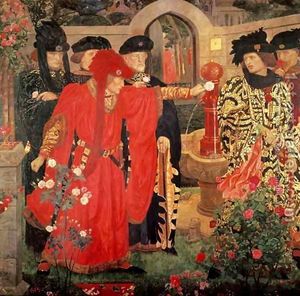
Introduction
The Folger Shakespeare Library in Washington, D.C., is the finest Shakespeare collection in the world. Henry Folger established the library because he regarded Shakespeare as “one of the wells from which we Americans draw our national thought, our faith and our hope.”[1] Folger’s interest in Shakespeare was inspired by a short speech he read as a young man by Ralph Waldo Emerson. Emerson argued that Shakespeare was “the first poet of the world,” that he “fulfilled the famous prophecy of Socrates, that the poet most excellent in tragedy would be most excellent in comedy,” and that he is “the most robust and potent thinker that ever was.”[2] Such a judgment was common among educated, and even uneducated, Americans from the earliest days of American independence. Shakespeare became something like what James Fenimore Cooper called him, “the great author of America.”[3] In Walt Whitman’s “maturest judgment” Shakespeare’s English history plays are “in some respects greater than anything else in recorded literature.”[4] Whitman wondered whether Shakespeare did not put “on record the first full exposé—and by far the most vivid one, immeasurably ahead of doctrinaires and economists—of the political theory and results” of a feudal system “which America has come on earth to abnegate and replace.” He speculated that “a future age of criticism . . . may discover in the plays named the scientific (Baconian?) inauguration of modern Democracy.”
—P.P.
[1] “History of the Folger Shakespeare Library,” Folger Shakespeare Library, accessed March 10, 2017, http://www.folger.edu/history.
[2] Atlantic Monthly, A Magazine of Literature, Science, Art, and Politics, (Volume 94, No. 563, 1904), p. 365.
[3] Richard A. Van Orman, “The Bard in the West,” Western Historical Quarterly Vol. 5, No. 1 (Jan., 1974), pp. 29-38, n. 1.
[4] Walt Whitman, “What Lurks Behind Shakspere’s Historical Plays?” Walt Whitman: Complete Poetry and Collected Prose (New York, The Library of America, 1982), 1148 ff.
On the Connection between Julius Caesar and Henry V
In his informative collection of essays on Shakespeare,[1] Timothy Burns tells us that he does not consider the history plays because his concern is politics, and “politics proper” is not found in those plays. “Full, natural, and robust” political life does not exist in the plays because the England they depict is Christian, and Christianity kills politics (6–8). So, Burns writes about Julius Caesar and the great tragedies, King Lear and Macbeth, but not Hamlet.
It would be worthwhile to consider whether Burns’s case against the history plays reflects an adequate understanding of either politics or Christianity. For the moment it will be enough to consider the related but more limited question of whether his approach reflects an adequate understanding of Shakespeare.
First, we should note that, contrary to Burns, politics as he defines it is not absent or suppressed in the history plays. Christianity does not stop Shakespeare’s characters from contending over the question who should rule, the contention Burns considers to be the heart and soul of politics (3–4). Indeed, one might say that the whole point of the history plays is to examine why the claim that Kings rule by divine right does not at all suppress “political life proper.” In the history plays, the divine right of Kings does not even rule divines in their political discussions and calculations, as the opening scene of Henry V makes clear. Not only do the Bishops in this scene calculate politically in a quite earthly way, they also evaluate Henry according to his natural virtues as a ruler (“miracles are ceased,” one Bishop remarks), making the case that for those virtues alone he deserves to rule. In other words, natural right is at work in the plays in a quite robust way.
Second, Burns’s dismissal of the history plays truncates his analysis of Julius Caesar and Shakespeare’s analysis of political life. In discussing Julius Caesar, Burns argues that the republican claim that possession of virtue confers a right to rule means that the most virtuous individual should rule. This means that rule by the virtuous leads to monarchy or rule by one person. Thus, the principle of republican rule undermines itself by leading to monarchy. (In evaluating this argument, it is worth reflecting on the career of George Washington.) This undermining is most evident in the fact that monarchy is at odds with the other republican principle, the equality or freedom of the virtuous. This tension between virtue and equality, Burns argues, animates the play. He suggests that one way in which this problem could be overcome would be for the most virtuous individual to be so virtuous that he is in fact a god, or in a decisive way above all other virtuous men. In this case, equality in virtue would remain true of all other virtuous men, who would still be equal with each other, and subordinate not to another man but fittingly only to a god.[2] Burns stops at this point. But his analysis suggests that republican principles lead not only to monarchy but to what one might call divine right monarchy. The tensions in republican government between the claims of virtue and equality resolve themselves in the claim of a god to rule. Furthermore, however, the tensions between the claims of virtue and equality lead to civil war, as Julius Caesar and Roman history indicate. Perhaps the best way to reduce the chance for civil war is to make the rule of the god or the divine right ruler hereditary.[3] Republican principles, then, lead not only to monarchy, not only to divine right monarchy, but to hereditary divine right monarchy. There is no better analysis of the problems of such a political organization and of the vain hope that divine right will encourage civil peace than the history plays. They show indeed that the problem presented in Julius Caesar is a permanent problem, because it has no solution.[4] In making manifest the problems of hereditary divine right rule, the history plays also make us wonder how the defects of that rule might be addressed.
Taking up the history plays would have done more than allow Burns to finish his analysis of the claim of virtue to rule. For moderns, Shakespeare offers an advantage over the authors of the ancient world. He understood Christianity and subtly portrays its effects on politics. Henry V is both a Christian king, “the mirror of all Christian Kings” (II.Chorus.6), and the greatest English monarch, having united England (even, it seems, the Irish, Scots, and Welsh!) at home, and brought both France and Burgundy to serve his purposes abroad.[5] Part of his success lies in his Christian, yet not simply pious, character and his ability to use the Church and the rule of God above to deal with problems here below. His natural and divine right to rule combine to give his brief reign stability and allow him to ennoble the lives of his subjects—although not all of them—by creating a certain equality between the King and all his subjects. All are equal in so far as all are subject to God. This is evident in the contrast between Henry’s stirring “band of brothers” speech before the battle of Agincourt, in which he emphasizes honor, above all his own, and the ennoblement even of the “vile,” and his instructions after it to give all glory for the victory to God. Roman political theology could not accomplish this feat because what made it plausible that an emperor could be a god also undermined that claim: Rome’s gods were too human. Yet, if Christianity presents political advantages, it also creates political problems, as Shakespeare displays in the discussion that Henry (disguised) has with some of his soldiers the night before the battle. Henry gets the soldiers to agree that “every subject’s duty is the King’s, but every subject’s soul is his own” (IV.1.182–83). This has the effect of reducing the King’s responsibility for the eternal fate of his subjects, but as Harry V. Jaffa pointed out, it raised another issue. If all are subjects of God, then the King’s subjects will have divided loyalties, having at least on occasion to choose between obeying either the King’s or God’s orders.[6] How to address this problem and other issues that Christianity raised in political life became a central issue in modern and American politics and remains so.
Burns lets us know that he does not care for modern politics (2, 4–5). In this disdain, he is somewhat like Prospero in the Tempest, when Prospero avoided politics for the sake of liberal studies. Burns, it appears, is convinced of the superiority to all political life of a life devoted to those studies. This conviction undergirds his interpretation of Julius Caesar. He sees Caesar as the best man in Rome (also as philosophic [31]), as a benefactor of Romans, and as justified in his ambition to be a monarch. The play does call our attention to the problems a man like Caesar poses to political life, but Burns ignores an equally important theme in the play. In Shakespeare’s trilogy of plays on Rome, Coriolanus precedes Julius Caesar. Coriolanus, a man of unsurpassed virtue, was forced by his virtue and sense of honor to deny his equality with other men and thus his Roman citizenship. He thus had to try to live outside Rome as a man. He discovered that he could not. Caesar aspired to live outside Rome’s republican political order as a monarch-god. Brutus rejects this solution to the problem. He recognizes with Cassius that Caesar is all too human (I.2.30ff).[7] Caesar is said to be the greatest man, but Brutus is said to be the noblest Roman (III.1.282–8; V.5.74). Caesar is willing to live outside republican Rome, to destroy it, to serve his mistaken sense of his superior humanity. Brutus will not abandon the republic. Burns takes the side of Caesar, and disparages Brutus. Shakespeare, however, does not, as the play makes clear. In making the case for Brutus as powerfully as he does, in reminding us of what was lost when the Caesarian idea triumphed, Shakespeare shows us that he does not take for granted the superiority of “liberal studies” to political life. This is an important part of Shakespeare’s political wisdom.
[1] Timothy W. Burns, Shakespeare’s Political Wisdom (New York: Palgrave MacMillan, 2013). All parenthetical page references in the text are to this book.
[2] Burns makes and then seems to withdraw the claim that Caesar wants to be a god, only to make it again. Consider pages 22 and 32–33. The argument that Burns suggests on page 22 is the same one that Harry V. Jaffa used in Crisis of the House Divided to reconcile equality as the basis of rule with Lincoln’s evident natural right to rule. See Harry V. Jaffa, Crisis of the House Divided: An Interpretation of the Issues in the Lincoln-Douglas Debates (1959; University of Chicago Press, 1982), 222.
[3] Macbeth may be taken as an illustration of the problems that arise from an elective monarchy.
[4] Shakespeare indicates the continuity between the Roman plays and the English history plays through a reference to Rome and Henry V as Caesar, V.0. 27–29, Henry V, ed. Barbara A. Mowat and Paul Werstine, Folger Shakespeare Library (New York: Simon & Schuster, 1995). All line references are to this edition.
[5] Henry V fulfills the requirements that Harry V. Jaffa argues are those of the greatest English King. See, “The Limits of Politics: An Interpretation of King Lear, Act I, scene I,” in Harry V. Jaffa, The Conditions of Freedom: Essays in Political Philosophy (Baltimore: Johns Hopkins University Press, 1975), 73.
[6] Harry V. Jaffa, A New Birth of Freedom: Abraham Lincoln and the Coming of the Civil War (Lanham, MD: Rowman & Littlefield Publishers, 2000), 128–29.
[7] Julius Caesar, ed. Barbara A. Mowat and Paul Werstine, Folger Shakespeare Library (New York: Simon & Schuster, 1992). Line references in the text are to this edition.




